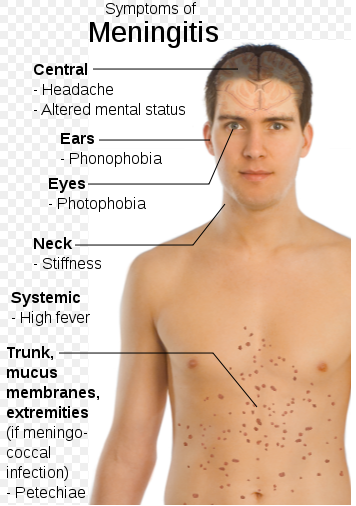NewsDesk @bactiman63
An 18-year-old resident of Bærum was admitted to hospital on 6 August with meningococcal meningitis.
Rikshospitalet reported on 8 August that he died of the disease. The 18-year-old participated in a Russian event on the island of Ios in Greece in week 30 together with approx. 500-600 other young people from next year’s Russian cohort in Asker, Bærum, Oslo and Nordre Follo. The Institute of Public Health (FHI) is in contact with these municipalities.

Meningococcal meningitis is caused by a bacterium (meningococcus). The disease is transmitted by droplet transmission. The most common way of infection is through saliva, for example by kissing and sharing glasses or bottles. The vast majority of cases of infectious meningitis are isolated cases, and it is very rare that the disease occurs in people who have had close contact with the sick person. To further reduce the risk, antibiotic treatment, so-called carrier eradication, can be given to people who may have been infected.
– The risk of getting infected if you are in close contact is basically low. In addition, the risk of becoming ill if infected is low. Carrier eradication for close contacts effectively reduces this risk further, says Sara Viksmoen Watle, senior physician at the Institute of Public Health.
– As a precautionary measure, we recommend that all young people who participated in the Russian event on Ios during the same time period and those who have been in close contact with the 18-year-old after returning from Ios, are followed up in particular. These can receive a dose of antibiotics at the local emergency room.
In addition, the vaccine will be able to prevent new cases of the disease at a later stage, and the vaccine is therefore recommended for close contacts of a case of infectious meningitis. FHI, in consultation with the municipal doctors in the affected municipalities, has decided that all the young people who have participated in the Russian event in question on Ios are to be considered as possible close contacts, as well as people who have been in close contact with the 18-year-old after returning home. They will therefore be offered a vaccine against meningococcal B. This vaccine will only provide protection after 6 weeks, and requires two doses. The vaccine is free for the group of close contacts above, while any others who wish to be vaccinated must pay for this themselves.
The affected municipalities are in the process of organizing the vaccination offer for the close contacts and it is recommended to follow the municipalities’ own information on when and how this offer will be available in the individual municipality.
There are different types of meningococcal bacteria (serogroups). The most commonly used vaccine among Norwegian youth protects against the types most often seen in this age group (the ACWY vaccine) in this country. This vaccine does not provide protection against serogroup B meningococcal bacteria, which has been demonstrated in the current case. There is a separate vaccine that protects against only serogroup B. Serogroup B disease is very rare among young people in Norway, and has not been seen in this age group since 2014. In other European countries, this type of bacteria occurs more frequently.
The Norwegian Institute of Public Health recommends vaccination against meningococcal B in people traveling to areas with a higher incidence of meningococcal B disease. This applies in particular to travelers who will participate in activities involving close contact with others over several days, such as at festivals, sports gatherings, youth camps etc., including Russian tours.
Symptoms of meningococcal meningitis
The first signs are often vague and may resemble flu-like illness. Typical symptoms can be:
- fever with chills
- headache
- nausea
- vomiting
- diarrhea
- the general condition is often severely impaired
– The bacterium that causes infectious meningitis can cause blood poisoning or meningitis. The patient may experience minor skin bleeding. These look like small red or bluish-red dots, and are characterized by the fact that they do not disappear when you press a transparent glass against them. Blood poisoning can develop quickly within a few hours, emphasizes Watle.
Neck stiffness and impaired consciousness are signs that can appear late in the course of meningitis. If you suspect illness, it is important to contact your GP or emergency room as soon as possible.
- Ebola vaccine, ERVEBO, now approved for use in children 12 months of age and older
- Kuru: A fascinating history of a devastating disease linked to cannibalism
- Anthrax in North Dakota: Four cases reported in Grant County
- Leptospirosis cases up in the Ilocos Region, Philippines
- Florida reports 9th Eastern Equine Encephalitis in a horse this year
- Dengue deaths top 300 in record setting year in Bangladesh
- Philippines: Dengue cases nearly doubled in Davao Region
- Crimean-Congo hemorrhagic fever case reported in North Macedonia

